UNTITLED (Trains and Tunnels)
Martín Ramírez (1895–1963)

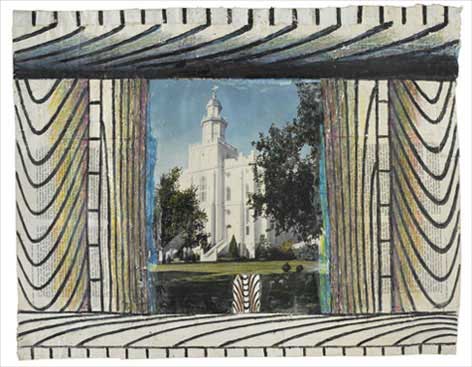
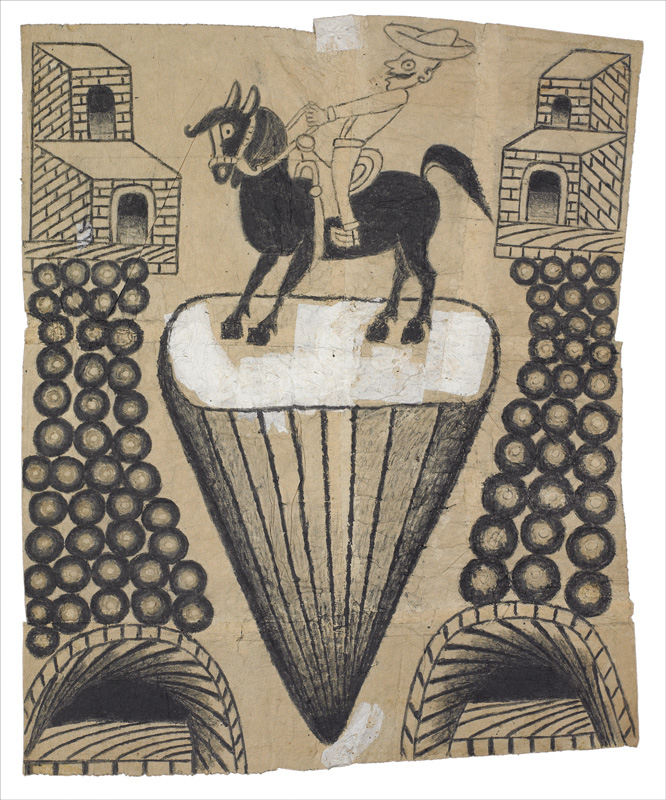
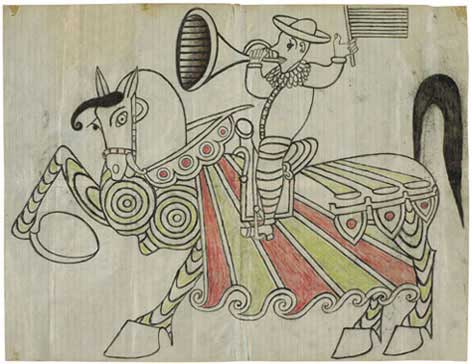
Considered one of the self-taught masters of twentieth-century art, Martín Ramírez (1895–1963) created hundreds of drawings and collages of remarkable visual clarity and expressive power within the confines of DeWitt State Hospital in Auburn, California, where he resided for the last fifteen years of his life. Nearly one hundred of these drawings and collages were on view in the American Folk Art Museum’s 2007 retrospective of the artist.
An astonishing development during the run of that exhibition was the discovery of a group of previously unknown works: more than 120 works on paper were brought to the museum’s attention by descendants of a doctor at DeWitt, Dr. Max Dunievitz—a remarkable find given that Ramírez’s known body of work up to that time had not exceeded about 300 drawings and collages. Dunievitz had secured supplies for the artist and collected the drawings made between 1960 and 1963—the last works. He also organized the first posthumous Ramírez exhibition, a 1963 show at DeWitt. “Martín Ramírez: The Last Works” features twenty-five artworks from this newly discovered treasure trove, including three drawings gifted to the American Folk Art Museum.
In this newly found body of work, Ramírez explored the same subjects and themes as in earlier years—horseback riders, trains and tunnels, landscapes, Madonnas, and animals. However, it is the previously known work with a twist: the familiar motifs are tweaked in subtle ways, and scale and material, while similar, are animated by a greater use of color and a bolder exploration of abstraction. Ramírez’s singularly identifiable figures, forms, line, and palette reveal an exacting and highly defined vocabulary, and they also show Ramírez to be an adventurous artist who embarked on remarkably creative explorations through endless variations on a few themes. Ramírez commemorated in all of his works the landscapes of Mexico and northern California; he recorded the hardscrabble territory of immigration, of living between borders, countries, and cultures. Memory, immigration, dislocation, and isolation exist in each line of his drawings. As a “border artist,” Ramírez displayed a kind of wanderlust for his meandering journey, and each composition thus became a beguiling act of documenting and, ultimately, sharing a life lived.
“Martín Ramírez: The Last Works” is made possible in part by support from Elizabeth A. Stern. Museum exhibitions are supported in part by the Leir Charitable Foundations in memory of Henry J. & Erna D. Leir, the Gerard C. Wertkin Exhibition Fund, and the New York City Department of Cultural Affairs.
- Karen Rosenberg
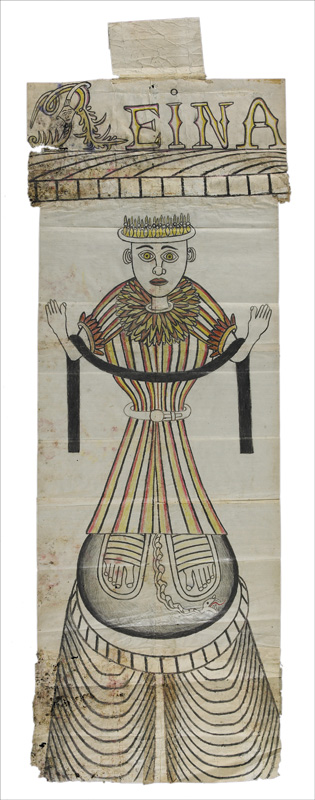
Untitled (Reina/Madonna)
Martín Ramírez (1895–1963)
Auburn, California
c. 1960–1963
Paint, crayon, pencil, and collage on lined paper
48 x 18 in.
American Folk Art Museum, gift of the family of Dr. Max Dunievitz and the Estate of Martin Ramirez, 2008.25.1
© Estate of Martín Ramírez; photo by Ellen McDermott, New York

Untitled (White Church with Abstract Sides)
Martín Ramírez (1895–1963)
Auburn, California
c. 1960–1963
Paint, crayon, pencil, and collage on found paper
18 x 22 1/2 in.
American Folk Art Museum, New York, promised gift of the family of Dr. Max Dunievitz and the Estate of Martin Ramirez, P1.2008.2
© Estate of Martín Ramírez; photo by Ellen McDermott, New York

Untitled (Horse and Rider on Pedestal with Brick Structures and Cannonballs)
Martín Ramírez (1895–1963)
Auburn, California
c. 1960–1963
Paint, crayon, and pencil on paper towels with cigarette papers
24 x 20 1/4 in.
Collection of Jennifer Pinto Safian
© Estate of Martín Ramírez; photo by Ellen McDermott, New York

Untitled (Armored Horse and Rider with Horn)
Martín Ramírez (1895–1963)
Auburn, California
c. 1960–1963
Paint, crayon, and pencil on lined paper
16 1/2 x 21 1/2 in.
Courtesy Estate of Martín Ramírez
© Estate of Martín Ramírez; photo by Ellen McDermott, New York

Untitled (Trains and Tunnels)
Martín Ramírez (1895–1963)
Auburn, California
c. 1960–1963
Gouache, crayon, colored pencil, and pencil on lined and pieced paper
17 x 78 in.
American Folk Art Museum, New York, promised gift of the family of Dr. Max Dunievitz and the Estate of Martin Ramirez, P1.2008.1
© Estate of Martín Ramírez; photo by Ellen McDermott, New York
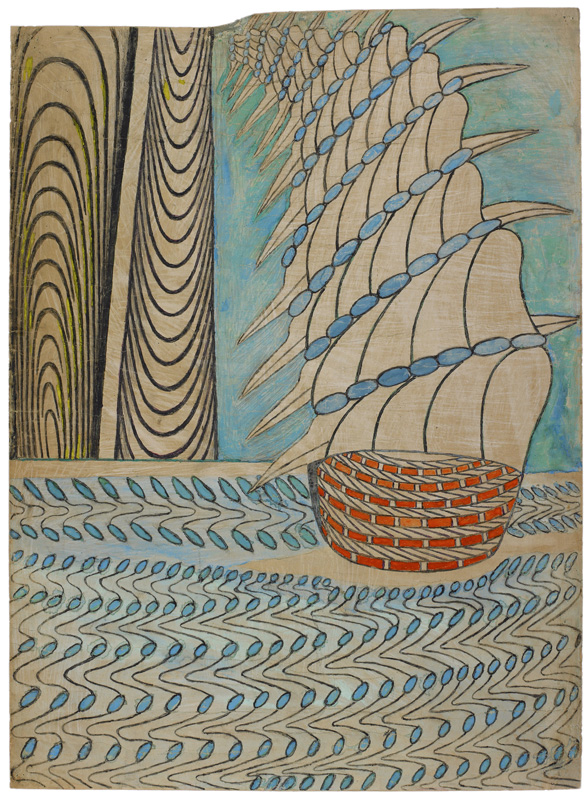
Untitled (Galleon on Water)
Martín Ramírez (1895–1963)
Auburn, California
c. 1960–1963
Gouache, colored pencil, and pencil on pieced paper
33 x 24 in.
Collection of Audrey B. Heckler
© Estate of Martín Ramírez; photo by Ellen McDermott, New York
“Martín Ramírez: The Last Works” is made possible in part by support from Elizabeth A. Stern. Museum exhibitions are supported in part by the Leir Charitable Foundations in memory of Henry J. & Erna D. Leir, the Gerard C. Wertkin Exhibition Fund, and the New York City Department of Cultural Affairs.
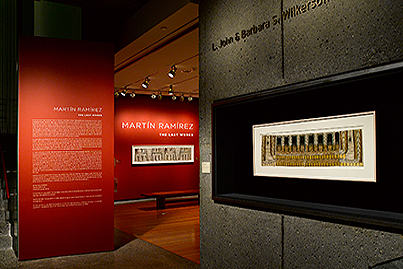
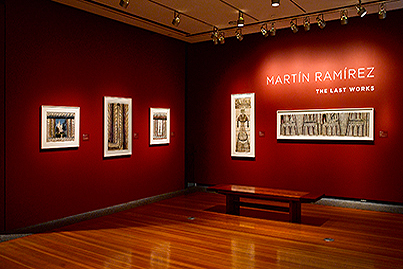
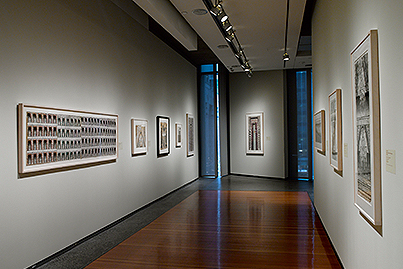
New York Times on discovery of new works
PDF